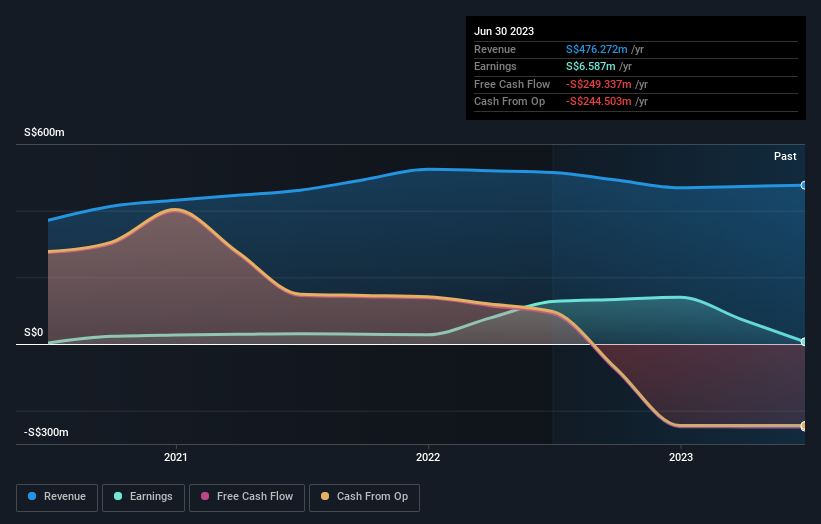Wing Tai Holdings Limited (SGX:W05) stock most popular amongst private companies who own 51%, while individual investors hold 30%
Key Insights
Significant control over Wing Tai Holdings by private companies implies that the general public has more power to influence management and governance-related decisions
52% of the business is held by the top 3 shareholders
If you want to know who really controls Wing Tai Holdings Limited (SGX:W05), then you'll have to look at the makeup of its share registry. The group holding the most number of shares in the company, around 51% to be precise, is private companies. Put another way, the group faces the maximum upside potential (or downside risk).
And individual investors on the other hand have a 30% ownership in the company.
Let's delve deeper into each type of owner of Wing Tai Holdings, beginning with the chart below.
See our latest analysis for Wing Tai Holdings
What Does The Institutional Ownership Tell Us About Wing Tai Holdings?
Institutional investors commonly compare their own returns to the returns of a commonly followed index. So they generally do consider buying larger companies that are included in the relevant benchmark index.
As you can see, institutional investors have a fair amount of stake in Wing Tai Holdings. This implies the analysts working for those institutions have looked at the stock and they like it. But just like anyone else, they could be wrong. It is not uncommon to see a big share price drop if two large institutional investors try to sell out of a stock at the same time. So it is worth checking the past earnings trajectory of Wing Tai Holdings, (below). Of course, keep in mind that there are other factors to consider, too.
Hedge funds don't have many shares in Wing Tai Holdings. Looking at our data, we can see that the largest shareholder is Wing Tai Asia Holdings Ltd with 29% of shares outstanding. Empire Gate Holdings Ltd. is the second largest shareholder owning 12% of common stock, and Wai Keung Cheng holds about 11% of the company stock. Wai Keung Cheng, who is the third-largest shareholder, also happens to hold the title of Chairman of the Board.
After doing some more digging, we found that the top 3 shareholders collectively control more than half of the company's shares, implying that they have considerable power to influence the company's decisions.
While it makes sense to study institutional ownership data for a company, it also makes sense to study analyst sentiments to know which way the wind is blowing. As far as we can tell there isn't analyst coverage of the company, so it is probably flying under the radar.
Insider Ownership Of Wing Tai Holdings
The definition of company insiders can be subjective and does vary between jurisdictions. Our data reflects individual insiders, capturing board members at the very least. Company management run the business, but the CEO will answer to the board, even if he or she is a member of it.
Most consider insider ownership a positive because it can indicate the board is well aligned with other shareholders. However, on some occasions too much power is concentrated within this group.
It seems insiders own a significant proportion of Wing Tai Holdings Limited. It has a market capitalization of just S$1.0b, and insiders have S$117m worth of shares in their own names. We would say this shows alignment with shareholders, but it is worth noting that the company is still quite small; some insiders may have founded the business. You can click here to see if those insiders have been buying or selling.
General Public Ownership
With a 30% ownership, the general public, mostly comprising of individual investors, have some degree of sway over Wing Tai Holdings. While this group can't necessarily call the shots, it can certainly have a real influence on how the company is run.
Private Company Ownership
Our data indicates that Private Companies hold 51%, of the company's shares. Private companies may be related parties. Sometimes insiders have an interest in a public company through a holding in a private company, rather than in their own capacity as an individual. While it's hard to draw any broad stroke conclusions, it is worth noting as an area for further research.
Next Steps:
I find it very interesting to look at who exactly owns a company. But to truly gain insight, we need to consider other information, too. Like risks, for instance. Every company has them, and we've spotted 4 warning signs for Wing Tai Holdings (of which 2 can't be ignored!) you should know about.
Of course this may not be the best stock to buy. Therefore, you may wish to see our free collection of interesting prospects boasting favorable financials.
NB: Figures in this article are calculated using data from the last twelve months, which refer to the 12-month period ending on the last date of the month the financial statement is dated. This may not be consistent with full year annual report figures.
Have feedback on this article? Concerned about the content? Get in touch with us directly. Alternatively, email editorial-team (at) simplywallst.com.
This article by Simply Wall St is general in nature. We provide commentary based on historical data and analyst forecasts only using an unbiased methodology and our articles are not intended to be financial advice. It does not constitute a recommendation to buy or sell any stock, and does not take account of your objectives, or your financial situation. We aim to bring you long-term focused analysis driven by fundamental data. Note that our analysis may not factor in the latest price-sensitive company announcements or qualitative material. Simply Wall St has no position in any stocks mentioned.

 Yahoo Finance
Yahoo Finance 

